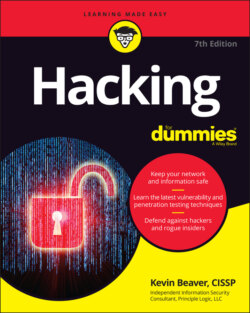Читать книгу Hacking For Dummies - Kevin Beaver - Страница 58
Conducting blind versus knowledge assessments
ОглавлениеHaving some knowledge of the systems you’re testing is generally the best approach, but it’s not required. Having a basic understanding of the systems you hack can protect you and others. Obtaining this knowledge shouldn’t be difficult if you’re testing your own in-house systems. If you’re testing a client’s systems, you may have to dig a little deeper into how the systems work so that you’re familiar with them. Doing so has always been my practice, and I’ve had only a small number of clients ask for a full blind assessment because most people are scared of them. I’m not saying that blind assessments aren’t valuable, but the type of assessment you carry out depends on your needs.
The best approach is to plan on unlimited attacks, wherein any test is fair game, possibly even including DoS testing. (Just confirm that in advance!) The bad guys aren’t poking around on your systems within a limited scope, so why should you?
Consider whether the tests should be performed so that they’re undetected by network administrators and any managed security service providers or related vendors. Though not required, this practice should be considered, especially for social engineering and physical security tests. I outline specific tests for those purposes in chapters 6 and 7.
If too many insiders know about your testing, they might improve their habits enough to create a false sense of vigilance, which can negate the hard work you put into the testing. This is especially true for phishing testing. Still, it’s almost always a good idea to inform the owner of the system, who may not be your sponsor. If you’re doing this testing for clients, always have a main point of contact — preferably someone who has decision-making authority.
